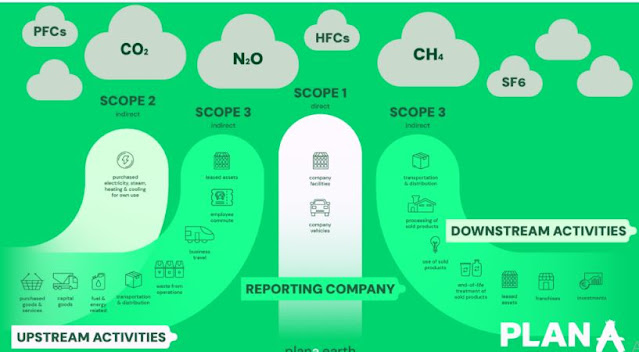Carbon accounting is the method used for calculating carbon dioxide emitted and consumed by a given entity: factory, company, city, state, vehicle fleet, nation, or otherwise. As governments shuffle unwillingly toward regulating greenhouse gas emissions, fierce debates have emerged over how to calculate them.
A basic concept is the "carbon footprint", and like any system analysis, a primary question is how much to include as part of the system: where to "draw the system boundaries", to use a phrase from thermodynamics. According to the British standard PAS (Products And Services)-2060, published in 2011 and since being adopted internationally, there are three scopes in carbon reporting. 1 & 2 are considered mandatory, 3 optional:
1) Direct emissions: from company assets (plants, offices, vehicle fleets)
2) Indirect emissions: from purchased energy supply (heat, electricity, air conditioning)
3) Indirect: rented properties, employee commute & business travel, operational waste, transportation & distribution.
Drawing the system boundary around the first two items, direct and closely related indirect emissions, is considered to be the minimum for reporting. Scope 3 makes the accounting look worse but is more responsible, as it involves activities not explicitly undertaken by but still resulting directly from a given organization.
This has led to the currently popular concept of "net zero", where a company's carbon dioxide production and consumption are combined into one final net value. Per PAS-2060, there are four steps: (1) measure; (2) reduce; (3) offset; (4) validate. The concept is based on the 2015 Paris Accord, to drop global carbon emissions to 45% of 2010 levels by 2030, and to zero net by 2050. The concept has come under immediate fire as a marketing ploy inadequate to the increasing pace of global warming.
Tomorrow: introduction to...statistics. Take heart--it won't be bad. Really!
Be well!







No comments:
Post a Comment